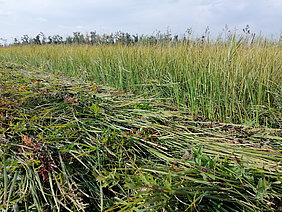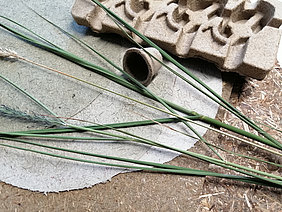Innovative solutions for the management of rewetted areas are the focus of a project launched beginning of 2022, which aims to advance the transformation process for land use on wet peatlands towards climate protection. In this context, the Leibniz Institute of Agricultural Engineering and Bioeconomy will develop solutions for regional added-value chains, among others in the field of fibers for paper products, insulation materials or peat substitutes. Coordinated by State Office for the Environment (LfU), the project "Preserving Brandenburg's peatlands in a climate-friendly way - initiating peatland preservation and management (BluMo)" is one of four pilot projects on peatland conservation funded by the German Federal Ministry for the Environment (BMUV) with a total of 48 million euros over a period of ten years.
Climate protection and climate adaptation projects through peatland management and improved landscape water balance are high up on the political agenda - not just in the State of Brandenburg. Brandenburg aims to save 700,000 metric tons of CO2 equivalents annually for its 2030 climate protection targets through peatland protection, including the rewetting of fens and peat conservation. Brandenburg has more than 165,000 hectares of fenland. Conservative calculations suggest that for the 750 ha of demonstration areas in the 'BluMo' project alone, raising the mean annual water table by 30 cm would have a climate impact of 3,249 t CO2-eq. per year, and for the surrounding catchments at least 11,250 t CO2-eq. per year.
However, other plant species such as reeds, sedges, reed canary grass or woody plants such as black alder will then dominate the areas that have until then been used for agriculture. There is currently a lack of practicable and profitable examples for switching to peatland-conserving or peatland-preserving management through paludiculture, i.e. agricultural production by cultivating crops on rewetted organic soils.
"Long ago, draining the peatlands and opening up fertile soil meant a great step forward for agriculture. Today we know that this is associated with high greenhouse gas emissions. In the 'BluMo' project, we want to demonstrate not only that it is feasible to rewet these areas, but also that it is possible to use them in a sustainable way in the future. In 'BluMo' we will develop the necessary techniques for this in collaboration with the agricultural sector," says ATB scientist Dr. Ralf Pecenka, summarizing the research tasks for his team. The scientists have already developed initial options for using biomass from paludiculture and are contributing this expertise to the project work.
With the establishment of long-term demonstration plots on a scale of at least 750 ha for plant populations that do not yet play an economic role in Germany, such as sedges, reeds and cattails, 'BluMo' is breaking new ground. Partners in the project are the Brandenburg State Office for the Environment (LfU) (coordination) and the Leibniz Institute for Agricultural Engineering and Bioeconomics (ATB). Together, they will establish peatland-adapted forms of cultivation and demonstrate how the utilization of biomass from wet peatlands can function economically. In this way, 'BluMo' aims to give farmers decisive impetus towards a change of direction in the management of peatlands. The establishment of an advisory service for wet peatland management and biomass utilization in the Rhinluch, the second largest peatland in Brandenburg, is intended to support this process. From the farmers' point of view, however, a successful changeover to wet peatland use can only succeed if sufficient economic utilization of the biomass produced and also reliable planning are possible.
ATB's main tasks in the project therefore include the development of a peatland-adapted cultivation technique as well as profitable utilization solutions for the biomass produced. ATB will contribute its decades of experience in the field of technology and process development, adapt established processes and develop new solutions for the special feedstock-specific requirements of paludiculture plants. While there are already a few marketable devices in the field of moorland-adapted cultivation technology, for example crawler vehicles for soil-conserving driving, the technical possibilities for material utilization of wet biomass are clearly lagging behind. In the sense of cascading biomass utilization, the priority here is a material use, which promises higher added value with a better climate balance in comparison to energy utilization.
"Our goal is to develop processes for the production of fibers from paludiculture biomass for peat substitutes, bedding pellets or board materials. Among other things, we are relying on our extensive experience in processing various plant fibers such as hemp or nettle," explains Dr. Ralf Pecenka. "We have already achieved promising experimental results with product samples made from paludiculture biomass - and we have some ideas about future regional value chains, for example in the area of fibers for paper products or insulation materials."
By the end of 2027, initial process solutions for the material utilization of paludiculture biomass are to be demonstrated on a practical scale. These will then be gradually developed into regional, cross-linked utilization concepts for peatland biomass by the end of the project in 2030, incorporating all stakeholders from agriculture and industry.
Funding: The German Federal Ministry for the Environment, Nature Conservation, Nuclear Safety and Consumer Protection (BMUV) is funding a total of 48 million euros over a period of ten years (2021 to 2031) for four pilot projects on peatland soil conservation in Germany's important large peatland regions in Schleswig-Holstein, Mecklenburg-Western Pomerania, Brandenburg and Bavaria. The projects take into account the specifics of the respective peatland types and regions. The aim is to identify solutions for reducing greenhouse gas emissions from managed peatland soils and to gain knowledge for climate protection. Project agency is Zukunft - Umwelt - Gesellschaft (ZUG) gGmbH. The Brandenburg-based project 'Preserving Brandenburg's peatlands in a climate-friendly way - initiating peatland preservation and management' is jointly run by the Brandenburg State Office for the Environment (LfU, coordination) and the Leibniz Institute for Agricultural Engineering and Bioeconomy e.V. (ATB). Within this context ATB is funded with almost 1.6 million euros. Duration is 10 years (01.01.2022 - 31.12.2031).
Contact:
Dr. Ralf Pecenka – Project coordination ‚BLuMo‘ at ATB
Tel.: +49 (0)331 5699-312, Email: rpecenka@atb-potsdam.de
Helene Foltan - Public relations
Tel.: +49(0)331 5699-820/-819, Email: presse@atb-potsdam.de


